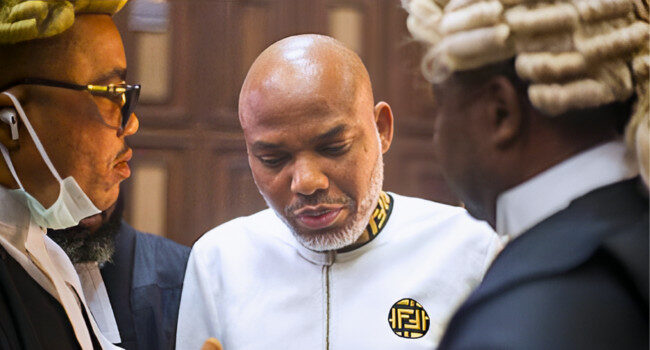ALOY Ejimakor, Former counsel to the proscribed leader of Indigenous People of Biafra (IPOB), Nnamdi Kanu, says no number of lawyers could have altered the court’s decision convicting him of terrorism.
Ejimakor spoke on Channels Television’s The Morning Brief programme on Monday monitored by News Point Nigeria, where he dismissed suggestions that stronger legal representation might have changed the verdict.
“I don’t believe one million lawyers standing behind Nnamdi Kanu would have changed the outcome of the case,” he said.
The lawyer said he disagreed with the judgment but acknowledged the court’s authority, arguing that the evidence did not clearly link Kanu’s broadcasts to the violence in the South-East.
“The deed is done. I disagree with the conviction, the verdict, and the sentence, but the judge might have believed he had sufficient evidence.
“I did not see a clear connection between the broadcasts and the violence that claimed many lives. The violence continues today. Is it still the broadcasts?” he said.
Ejimakor compared Kanu’s trial to historic cases involving public and political figures and argued that a similar pattern surrounded Kanu’s prosecution.
“The people who brought Jesus before Pontius Pilate had already made up their minds. They refused to release another condemned man and insisted on crucifying Christ.
“Nelson Mandela was not tied to violence in South Africa, but was convicted anyway. No weapon was found. His personality was considered a threat.”
Also referencing the 1960 Awolowo case, he said, “Awolowo was convicted of attempting to overthrow the government, yet he was a civilian. No evidence showed he had the means or opportunity.
“So in this very case (Nnamdi Kanu), I am not saying the judge was biased, but it was palpable that the system was determined to see him convicted. It started the day he was seized in Kenya.”
Justice James Omotosho on Thursday convicted Kanu on seven counts of terrorism and sentenced him to life imprisonment.
He ruled that Kanu’s broadcasts incited attacks on security agencies, destruction of infrastructure, and threats to diplomatic missions.
Justice Omotosho insisted that Nigeria remains an indivisible state and said self-determination cannot be pursued through violence.
He ordered the forfeiture of Kanu’s transmitter and directed that he be held in a secure facility without digital access.
Kanu’s lawyers described the sentence as excessive and vowed to appeal.
Ejimakor confirmed Kanu’s transfer to the Sokoto Custodial Centre and criticised the move, saying it separated him from his family and legal team.
Kanu was first arrested in 2015, fled after a 2017 military raid, and was re-arrested in Kenya in 2021 under disputed circumstances.







